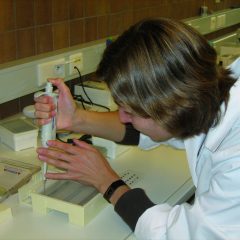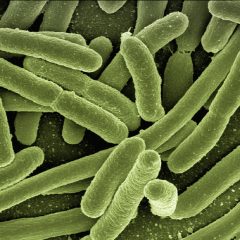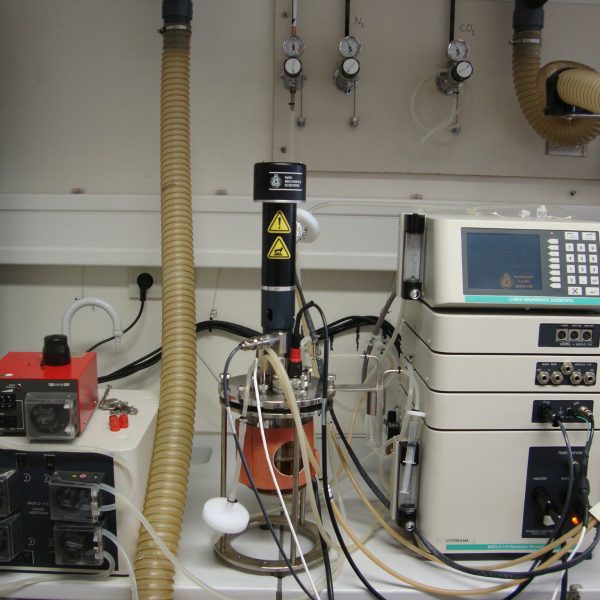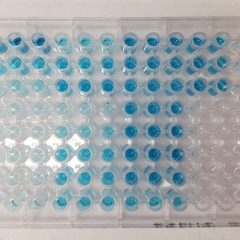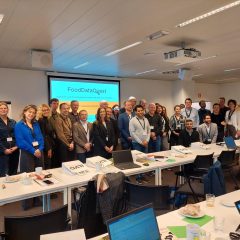Dossier Gut health
Nutritionally balanced and functional food can contribute to good gut health, which supports overall health. ILVO's expertise in nutrition and digestive physiology is applied to specific target groups and to pigs as a model in order to investigate the link between nutrition, the gut and health under controlled conditions.
What does ILVO do?
-
Multidisciplinary study of gut health in pigs as part of performance, health, and nitrogen emissions.
-
 The interaction between nutrition and gut health is being investigated in (mini) pigs as a model for humans.
The interaction between nutrition and gut health is being investigated in (mini) pigs as a model for humans. -
 Study of the link between food and specific food components, the gut microbiome and metabolite production, and our health.
Study of the link between food and specific food components, the gut microbiome and metabolite production, and our health.
The food - gut - health triangle
What we eat affects our entire metabolism. Nutrition provides building blocks for growth and a balanced diet is essential for good health. Links between nutrition and health are being reported almost daily, yet there so much we don't know. After all, much research on humans is based on epidemiological research, in which links are studied but in which it is not always easy to indicate causality (cause-effect).
The importance and role of the gut microbiota (all the bacteria present in the gut) is gradually becoming clear. Our diet co-determines the composition of the microbiota in our gut. That gut microbiome is important for our health and for the resistance against both infectious and non-infectious diseases.
A complex but important interaction
However, this complex interaction between nutrition, gut (microbiota) and health is still insufficiently known and studied. Unraveling the interaction between nutrition, gut (microbiota) and health can provide insights into various fields: from animal production to research on chronic, non-communicable diseases in humans. Nutrition can thus be used to support the (intestinal) health of humans and animals and possibly also reduce antibiotic use in production animals such as pigs by increasing their resistance.
Functional foods or nutraceuticals (products and ingredients with medicinal properties) could play a role in this if they can be shown to have additional health effects beyond meeting our basic nutritional needs.
Importance for animal production
In young animals, proper development of the gut and intestinal microbiota is crucial to achieving resilient animals. Young animals are the most susceptible to disease, which is a major reason for antibiotic use. With optimal nutrition, we can make animals more resilient, thus preventing disease outbreaks or limiting their severity.
Yet we often do not have a ready-made solution. Problems are often complex and solutions do not apply under all circumstances. Further knowledge building and innovation are therefore necessary. This stimulates companies to develop innovative animal feed applications. ILVO joins them in their search and developed a multidisciplinary intestinal health platform in pigs together with the University of Liege-campus Gembloux Agro-Bio Tech.
Importance for humans: increase in chronic, non-communicable diseases
In recent decades, the incidence of chronic non-communicable diseases such as cardiovascular disease has been rising sharply. Together, these conditions account for 71% of global deaths and also cause societal pressures through high morbidity (WHO fact sheet Noncommunicable diseases, 2018).
The development of chronic diseases such as metabolic, cardiovascular, neurodegenerative and autoimmune diseases is complex and multifactorial. These diseases are all characterized by the presence of chronic inflammation. In addition to hereditary predisposition, environmental factors and lifestyle such as limited exercise, a Western-style diet and exposure to environmental contaminants are important risks for the development of these diseases. However, the underlying mechanisms have not yet been fully unraveled.
Nutrition can indeed help with prevention
An important interaction between nutrition and health takes place in the gastrointestinal system, which ensures the absorption of necessary nutrients, is in direct connection and interaction with the brain, and at the same time defends our body against infiltration of harmful substances and microorganisms..
When these strictly regulated processes are disrupted, they can lead to dysbiosis (unbalancing of the gut microbiota) and the infiltration of antigens and metabolites in genetically susceptible individuals can cause an accumulation of inflammatory responses, which in turn can lead to the development of chronic diseases. Measures such as choosing a balanced and varied diet can therefore contribute to the prevention of these conditions.
Minipigs as a model for humans
The interaction between diet and health, together with the role of the gastrointestinal system and the gut microbiome, is complex and not yet sufficiently understood. In order to investigate how nutrition can be used as a preventive measure that can influence gut health and thus have a beneficial effect on overall health, ILVO uses (mini)pigs as a model for humans.
Since the gastrointestinal system of the pig is very similar to that of humans in terms of form and function, it is an excellent model for research into the interaction between nutrition and (intestinal) health. On the other hand, in vitro fermentations are also used on human fecal samples to study the effect of food components on the gut microbiome.
Gut health and the brain
There is a strongly growing awareness of the importance of nutrition for health and disease and the effect of nutrition on our gut microbiome, which in turn interacts with our brain - the so-called gut-brain axis.
A link between the gut microbiome and various neurological diseases such as Alzheimer's and Parkinson's has already been confirmed.
In patients, there is less microbial diversity observed in the gut microbiome than in healthy people. Moreover, their gut microbiome is characterized by different bacterial proportions, with some microbial groups overrepresented at the expense of others.
ILVO research with Parkinson's patients
ILVO specifically researches the gut microbiome of persons with Parkinson's disease (versus healthy elderly people) and the impact of food and food components on it. For example, what is the effect of certain fibers on the gut microbiome and on the production of certain metabolites such as short-chain fatty acids?
The research is still ongoing, but has already made clear that certain food components have effects on the gut microbiome, and that these effects differ between healthy elderly people and Parkinson's patients. Differences are also noticeable in the kinetics of production of certain metabolites. ILVO uses in vitro fecal fermentations for this research.
A new multidisciplinary gut health platform at ILVO
In order to investigate the link between nutrition, the gut and health under controlled conditions, ILVO relies on expertise in nutrition and digestive physiology that is pooled in a gut health platform. The platform is a collaboration with external partners such as Agro-Biotech in Gembloux. It is based on the development of analytical expertise in which gut health, the gut microbiome and other physiological parameters are studied by means of a multi-omics approach (metabolomics, transcriptomics), epigenetics, molecular biological techniques and the use of appropriate human models such as (mini)pigs as well as in vitro gut models based on bioreactors.
For further reading:
- Food: Balanced and healthy: through all kinds of channels (whether scientifically based or not) this topic is increasingly figuratively landing on our plates. But how can we still see the forest for the trees?
- Nutrition for target groups: Adapted nutrition for people with neurological disorders
- Food: Research on taste and smell: Healthy food has to taste good, otherwise no one will eat it. Therefore, taste and smell are also important.
- Allergens: For people with a food allergy, the presence of even a small amount of an allergen can have serious consequences.
Contact an expert

Research projects

